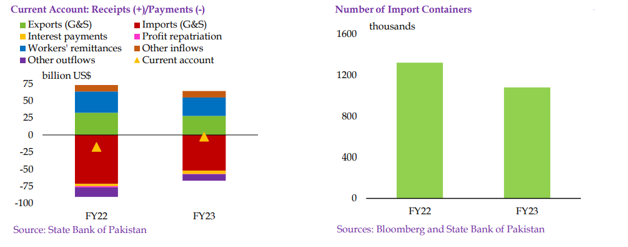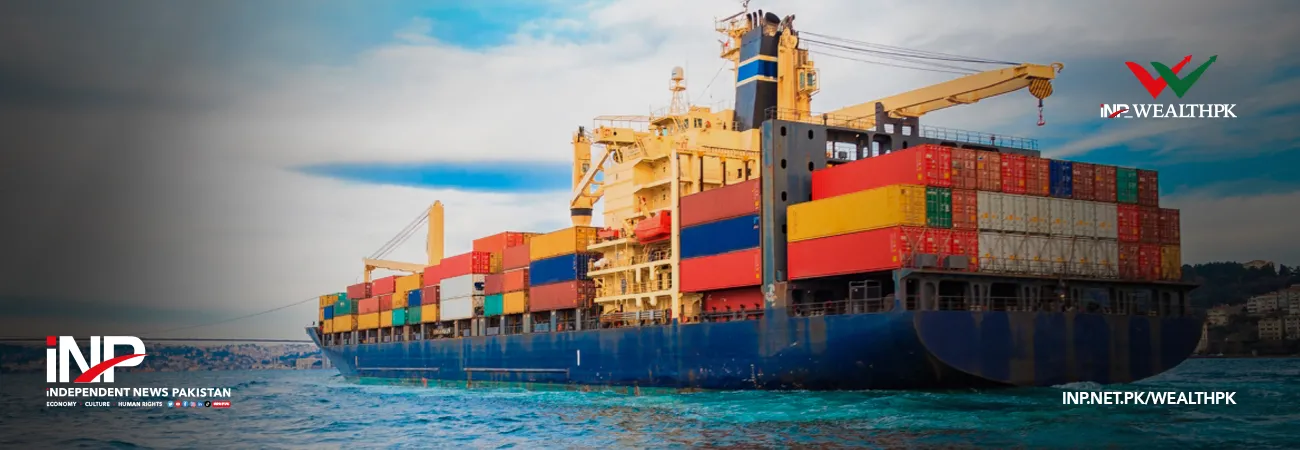INP-WealthPk
Qudsia Bano
Pakistan's services trade deficit witnessed a remarkable narrowing in the fiscal year 2022-23, plunging to just $0.8 billion from $5.8 billion in the previous year. This eye-catching development can be attributed to several factors, primarily a substantial decrease in services imports and freight payments, as detailed in the latest economic report. The report highlights that services imports in FY23 contracted by a staggering 37.7%, falling to $8.1 billion from $12.9 billion in FY22. The most substantial driver behind this decline was the remarkable reduction in freight payments, closely linked to a drop in merchandise imports. This correlation is backed by the data showing a decline in the number of import containers during the year. Furthermore, the fall in global shipping rates to pre-pandemic levels also contributed significantly to the reduction in freight costs.
It is important to note that the surge in freight costs observed in FY22, following the post-Covid spike in global trade volumes, had put considerable strain on the global shipping industry. However, these pressures began to fade as global trade returned to a state of normalcy in FY23, ultimately leading to a decline in freight costs. On the other hand, an interesting twist in the services trade equation came from the import of travel-related services. The report revealed that travel-related services recorded an uptick, reaching $1.9 billion in FY23, up from $1.4 billion in the previous year. This increase was primarily fueled by the resumption of international flights, with personal air travel, especially for education and religious purposes, surging by 33.1% from FY22. The uptick also reflected more expensive air tickets due to higher international oil prices.

In terms of exports, Pakistan's services sector displayed resilience by growing 2.8% to $7.3 billion in FY23. The information and communication technology (ICT) services, which have the largest share in services exports, nearly maintained their FY22 levels, standing at $2.6 billion in FY23. This plateauing of ICT exports was attributed to a decline in imports of state-of-the-art IT equipment required for high-end software production. Additionally, some exporters refrained from bringing their remittances back to Pakistan due to concerns over exchange rate volatility. Dr Uzma Zia, a senior research economist at the Pakistan Institute of Development Economics (PIDE), while talking to WealthPK said that the dramatic reduction in the services trade deficit was indeed a significant and encouraging development. "It reflects a commendable level of adaptability within Pakistan's services sector, which has successfully responded to the shifting global trade landscape."
She said: "The decline in service imports, especially attributed to lower freight payments, demonstrates the sector's resilience and ability to mitigate economic challenges. Moreover, the increase in travel-related services exports and the steady performance of ICT exports underline the sector's potential for growth and contribution to the country's economic stability. These developments are a positive sign of progress, suggesting that Pakistan is on a path toward more balanced and sustainable trade dynamics, with the potential for further growth and development in the coming years." Uzma Zia said as Pakistan continues to strengthen its economic position, these developments in the services trade sector offer a promising glimpse of a more balanced and sustainable trade environment in the years to come.
Credit: INP-WealthPk













